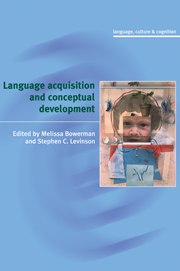Book contents
- Frontmatter
- Contents
- Preface
- Introduction
- Part 1 Foundational issues
- 1 The mosaic evolution of cognitive and linguistic ontogeny
- 2 Theories, language, and culture:Whorf without wincing
- 3 Initial knowledge and conceptual change: space and number
- Part 2 Constraints on word learning?
- Part 3 Entities, individuation, and quantification
- Part 4 Relational concepts in form–function mapping
- Author index
- Subject index
3 - Initial knowledge and conceptual change: space and number
Published online by Cambridge University Press: 26 January 2010
- Frontmatter
- Contents
- Preface
- Introduction
- Part 1 Foundational issues
- 1 The mosaic evolution of cognitive and linguistic ontogeny
- 2 Theories, language, and culture:Whorf without wincing
- 3 Initial knowledge and conceptual change: space and number
- Part 2 Constraints on word learning?
- Part 3 Entities, individuation, and quantification
- Part 4 Relational concepts in form–function mapping
- Author index
- Subject index
Summary
How do humans build the rich and intricate systems of knowledge that are characteristic of our species? How variable are these knowledge systems across human cultures, and what are their universal properties? What accounts for the flexibility, adaptability, and open-endedness of human knowledge systems on the one hand, and the ease of acquisition of some systems on the other? Finally, what differences between humans and other animals, even our closest primate relatives, lead only humans to develop highly elaborated knowledge systems?
Traditional answers to these questions are incomplete at best. On one view, humans are endowed with a powerful capacity for learning, shaping new concepts and beliefs to fit the environment. This view might account for the flexibility and adaptability of human knowledge systems but cannot readily explain why humans develop knowledge rapidly in some domains but slowly, with great difficulty, in others (see Chomsky 1975, and Keil 1981). On a second view, humans are endowed with domain-specific, core cognitive systems around which elaborated knowledge grows. This view might account for the ease of acquisition of certain knowledge systems but not for humans' ability to develop systematic knowledge in genuinely new domains or to change conceptions in radical ways (see Carey 1985; Hatfield 1990).
In this chapter, we explore a third answer to our opening questions. Humans, we suggest, are endowed with a set of core systems of knowledge, but the systems have critical limitations.
- Type
- Chapter
- Information
- Language Acquisition and Conceptual Development , pp. 70 - 98Publisher: Cambridge University PressPrint publication year: 2001
- 33
- Cited by

